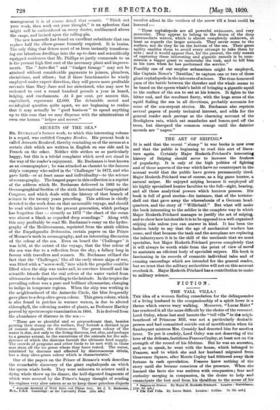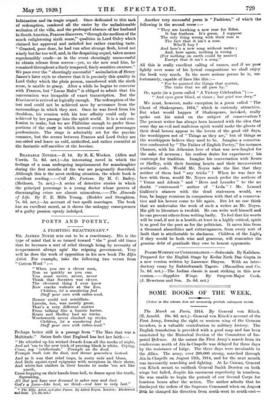FICTION.
THE TALL VILLA.t
THE idea of a woman finding consolation for the delinquencies of a living husband in the companionship of a spirit lover is a theme which craves wary walking. Moreover, "Lucas Malet" has renderedit all the more difficult by the choice of the revenant. Lord Oxley, whose lost soul haunts the " tall villa" in the neigh. bourhood of Primrose Hill, was not a particularly desirable person and had committed suicide out of mortification when his flamboyant mistress Mrs. Cressidy had deserted him for another lover. To put it crudely, Lord Oxley was not deserving of the love of the delicate, fastidious Frances Copley, at least not on the strength of the record of his lifetime. But he was an ancestor, and, -so to speak, he went with the house, which belonged to Frances, and to which she and -her husband migrated from Grosvenor Square, after Morris Copley had frittered away their fortune in rash speculation. Frances knew nothing of the story until she became conscious of the • presence. When she learned the facts she was smitten with compassion; fear and curiosity emerging in compassion, in the desire to help and emancipate the lost soul from his thraldom to the scene of his • Sniping iw Pr6nee. By Major H. Resketh-Prichard. London : Hatehhthon. [12s. 6d. net.] * The Tall Villa. By Lucas Malet. London: Collins. 7s. 6d. net.] infatuation and its tragic sequel. = Once dedicated to this task of redemption, rendered all the easier by the unfashionable seclusion of the villa, and the prolonged absence of her husband in South America, Frances discovers, " through the medium of the much enlightening sixth sense," qualities in Lord Oxley which claimed her approval and satisfied her rather exacting taste. " Granted, poor dear, he had run after strange flesh, loved not wisely but far too well, and, in the despairing sequel, taken means reprehensibly crude—as in the event shoutingly unsuccessful to obtain release from sorrow—yet, as she now read him, he remained throughout a finely tempered, finely sensitive creature." We pass over the " shoutingly successful " assimilation of Henry James's later style to observe that it is precisely this quality in Lord Oxley which the plain person, unendowed with the sixth sense, is unable to grasp. After a while he begins to converse with Frances, but "Lucas Malet" is obliged to admit that his conversation was incapable of exact transcription. But the ilinoilment is arrived at logically enough. The redemption of the lost soul could not be achieved save by severance from the surroundings in which they met. Once he was freed from his thraldom, his reunion with his true affinity could only be achieved by her passage into the spirit world. It is a sad con- fession to make, but we are Philistine enough to prefer those portions of the story in which normal events and personages predominate. The stage is admirably set for the psychic romance, but the scenes between Frances and Lord Oxley are one-sided and leave us cold, unthrilled, and rather resentful at the fantastic self-sacrifice of the heroine.







































 Previous page
Previous page